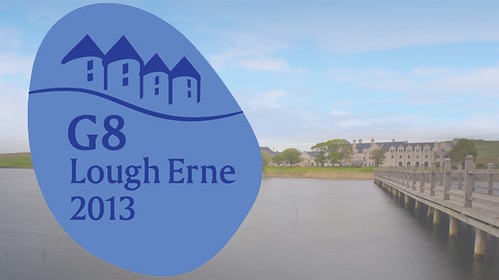17th June 2013
Universal and Individual: Pope and PM address “the golden thread of development” before the G8 Summit

In an exchange of letters on the eve of the Lough Erne G8 Summit, Pope Francis and Prime Minister David Cameron have shared detailed analysis of what needs to be done to tackle the economic and political challenges faced by the world today.
The Prime Minister took the initiative to inform the Pope on 5 June of the agenda for Britain’s G8 Presidency. Responding to Pope Francis’s eloquent arguments in homilies, messages and speeches since his election about the need to rebalance the global economy, help the poor and disadvantaged, and find people work, David Cameron noted that these priorities were shared by the UK. “I am determined”, David Cameron wrote, “that our G8 agenda will lead to real benefits for the global economy and will help people in developed and developing countries alike … by restoring strong and sustainable growth to the world economy by practical action on fairer taxes, freer trade, and greater global transparency”. He called on governments, business and faiths to “travel together” for good governance and justice, poverty alleviation and economic growth that promotes social inclusion.
Pope Francis replied on 15 June to welcome Britain’s efforts to ensure that “attention to the human person” remains at the heart of our global political and economic efforts. The Pope insisted that “concern for the fundamental material and spiritual welfare of every human person is the starting-point for every political and economic solution and the ultimate measure of its effectiveness and its ethical validity”. And, echoing a phrase used frequently by David Cameron looking at the post-2015 international development agenda, Pope Francis recognised the significance of respect for the law, transparency and government responsibility as “the golden thread of development” for the future.
What is striking about the exchange is not so much that Prime Minister and Pope agree on so much – though there is that – but its universality. The Prime Minister wrote to the Pope before Lough Erne because the United Kingdom recognises that the Pope speaks like no other world leader to a global constituency, Catholic and non-Catholic alike. This is important for us, because when the UK addresses issues like sexual violence in conflict, malnutrition, free trade or government transparency, we do so at a global, not parochial level. Pope Francis has argued how the individual human being must be at the heart of global economic and political policies. The UK agrees that by addressing such issues at a global level, governments can and should improve the lives of the most vulnerable and disadvantaged individuals.
Have a beautiful and successful day …..hoping and praying for the children of the world……that they can live good and healthy lives…..with the help of G8…..x